Pediatric Aortopathy Program
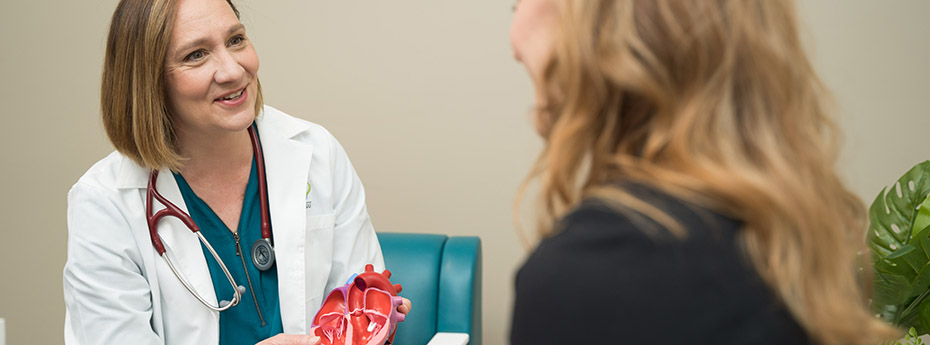
OHSU Doernbecher Children’s Hospital offers the most complete care in Oregon and southwest Washington for children with disorders of the aorta.
Our program includes:
- The region’s only team of specialists in genetics and children’s heart care working together.
- The latest technology and techniques to diagnose and treat complex genetic heart conditions.
- Skilled children’s heart surgeons with experience replacing aortas and valves.
- Genetic counselors to help you understand your family’s risks, testing options and results.
Understanding aortopathy
Aortopathy is a disease of the major blood vessel (aorta) from the heart to the body. It can also affect the aortic valve, which opens and closes to control blood flow out of the heart.
Aortopathy usually results from an inherited connective tissue disorder that enlarges and weakens the aorta and other blood vessels. (Learn more about genetic syndromes.) Other conditions, such as bicuspid aortic valve, can also cause it.
If your child has aortopathy, it’s important to seek early, expert care. Without treatment, the fragile aorta can suddenly tear (dissection), a life-threatening condition. Our advanced, team-based program makes it possible for children with aortopathy to lead long, full lives.
Conditions we treat include:
- Marfan syndrome
- Loeys-Dietz syndrome
- Vascular Ehlers-Danlos syndrome
- Bicuspid aortic valve and aneurysm
- Turner syndrome
Aortic Aneurysm
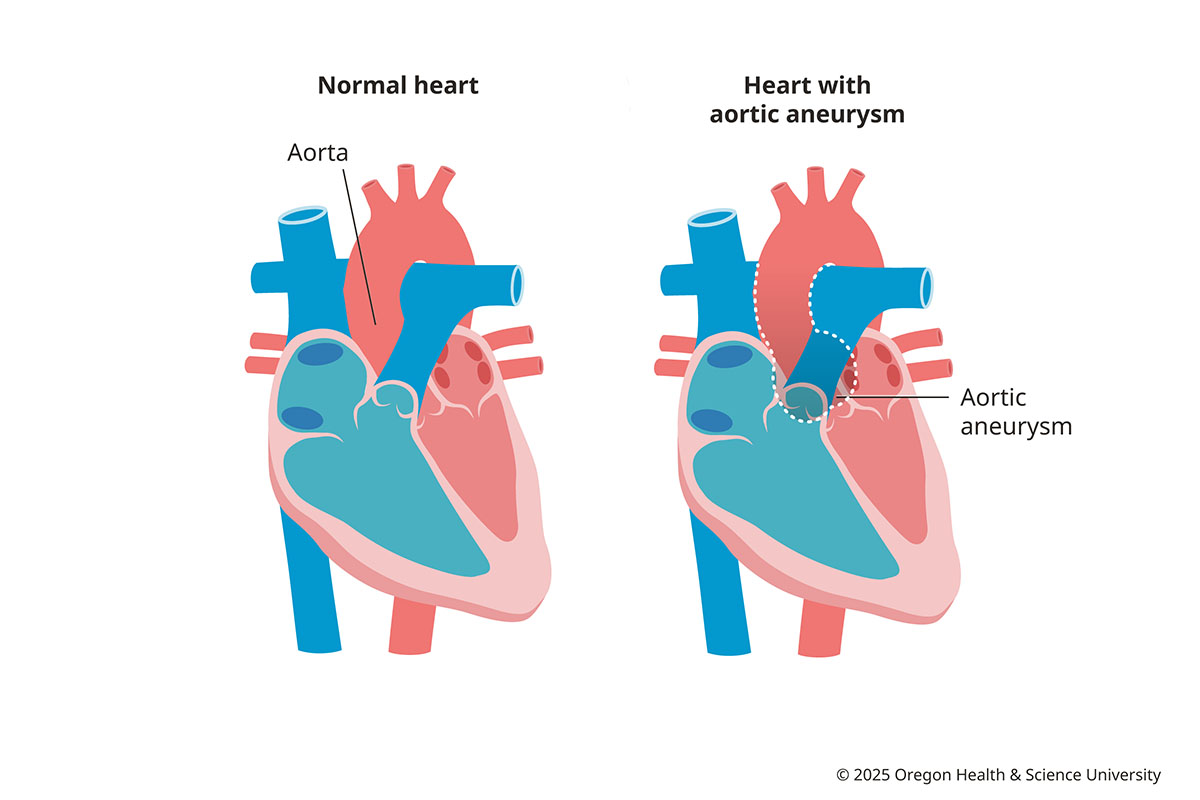
What to expect
Genetic counseling: Because aortopathy often runs in families, other relatives might need to be screened. Our genetic counselors can talk with you about your family history, risk factors, testing options and test results. Genetic counselors will call you before your first visit to get a head start on a detailed family history for you and your child. We may be able to see a parent and sibling in the same visit.
Streamlined care: We will work to schedule visits with specialists, such as genetics experts and cardiologists, on the same day. We also work closely with the OHSU Knight Cardiovascular Institute’s aortic program and adult congenital heart disease program to offer care from infancy through adulthood.
Expertise: Our doctors include leading specialists in diseases of the aorta. Dr. Lars Grosse-Wortmann, our division head, led the aortopathy clinic at the renowned Hospital for Sick Children in Toronto. Dr. Kathryn Holmes is a national leader in caring for children with connective tissue disorders, including Marfan syndrome, that weaken the aorta. Dr. Michael Silberbach is a national expert on Turner syndrome and leads a team of Turner specialists in heart care, hormones, fertility and autoimmune disorders.
Team-based care: We bring together specialists and resources from across Doernbecher and OHSU to provide care tailored to your child’s needs. We also work with your child’s regular doctor to coordinate care in your community.
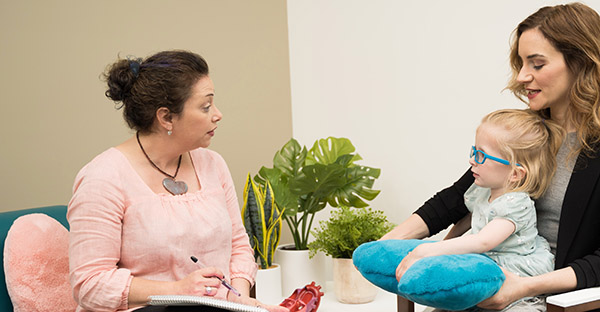
Diagnosing aortopathy
Aortopathy is a complicated condition that is often linked to other complex health conditions. We offer the most advanced tests and tools to evaluate your child’s heart, valves and blood vessels.
Our imaging laboratories are on-site so we can give you fast results. You may even learn that your child doesn’t have a serious heart condition, a common outcome of our screenings.
Your child’s tests may include:
- Echocardiogram
- Cardiac MRI (magnetic resonance imaging)
- CT (computed tomography) scan
- Genetic tests
If a genetic heart condition is found before birth, we will work with your fetal heart care specialists to plan the best care before and after delivery.
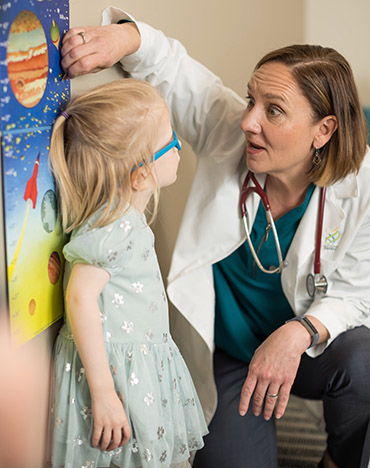
an important part of our aortopathy program.
Aortopathy treatments
Treatment advances have dramatically improved the length and quality of life for children with aortopathy. At Doernbecher, our team has the expertise and experience to understand the severity of your child’s condition.
When the walls of the aorta are weak and stressed, the inner layer can rip. If this happens, blood can leak into the chest and the aorta can burst. Most children and adults can avoid this life-threatening complication with aortic replacement at the right time.
Your child’s treatment may include:
Monitoring and lifestyle changes
Children with mild or moderate aortic enlargement may not need immediate treatment. We will monitor your child with regular visits and tests, including echocardiograms.
We will talk with you about lifestyle changes, such as exercise. Most children with aortopathy can remain active, but many should avoid intense exertion that strains the weakened aorta. We will help you find activities that keep your child moving with minimal risk.
Medication
Your care team may recommend medications to lower your child’s blood pressure and relax tension in the aorta. Some medications can slow the disease and delay surgery. We take part in research to develop and test medications to slow enlargement of the aorta.
The most common medications are:
- Angiotensin receptor blockers to reduce tension in the aortic walls and ease blood flow out of the heart.
- Beta blockers to lower blood pressure, regulate heart rhythm and slow the enlargement of the aorta.
Surgery
Our children’s heart surgery team offers the latest techniques to replace your child’s aorta and aortic valve.
We delay surgery as long as possible to give your child’s heart time to grow. Your care team will talk with you about the right time for surgery for your child.
We are the only hospital in Oregon and southwest Washington with two children’s heart surgeons who often work as a team in the operating room. They are available 24/7 and are skilled in operations such as:
- Valve-sparing aortic surgery: If your child’s aortic valve works well, we can replace only the aorta.
- Full replacement: We replace all or part of your child’s aorta with a thin, synthetic tube. We also replace the valve with a mechanical one. Sometimes babies and younger children receive a donated human valve.
- Mitral or tricuspid valve repair: Sometimes the mitral or tricuspid valve bows and becomes leaky. If the leaking becomes severe, surgery or replacement may be needed.
For families
Call 503-346-0640 to:
- Request an appointment.
- Seek a second opinion.
- Ask questions.
Locations
Parking is free for patients and their visitors.
Doernbecher Children’s Hospital
700 S.W. Campus Drive
Portland, OR 97239
Map and directions
Find other locations across Oregon and in southwest Washington.
Refer a patient
- Refer your patient to OHSU Doernbecher.
- Call 503-346-0644 to seek provider-to-provider advice.
Foxy’s world
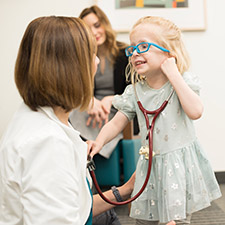
Meet Foxy Kusin, who has a sparkling personality and a team of Doernbecher specialists to care for her heart condition and related Marfan syndrome.